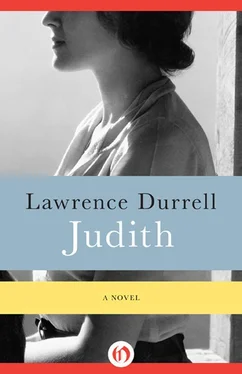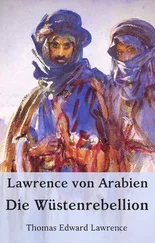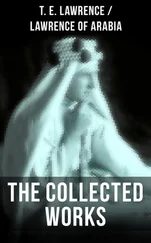“It is easy to say.”
“I know it is.”
“But you are right. I do feel guilty after what I have been through — guilty because there was always a way out. I could have committed suicide, could I not? Yes, but I was too much of a coward. I prayed for the courage, but I never found it. But since I endured and did not kill myself, I am indeed guilty, am I not?”
“Of course. But you must stop regarding it as a very exceptional or original matter. The extent of human guilt is boundless, endless, without horizons. I live and pray my wretched life away here, imagining that I am free from it. But I know I am as guilty as anyone, as guilty as you. In fact, from my point of view, your case is a perfectly ordinary one, and it is sheer stupidity for you to allow it to ruin your ordinary life. You are a victim of false pride, Grete, that is all. Your life is not ruined, as you think… He broke off.
She stared at him, or rather stared through him, through the wall, the streets, through Jerusalem to Germany, to her childhood. She drew a deep breath.
“False pride ?”
“Yes. This is what has ruined your power of choice, and made you believe that you are worthless, no good to anyone. You said a moment ago that you did not know whom to love — this is why. As a matter of fact it is not life around you which has changed — it is your own angle of vision. You are seeing things through a mist of false self-esteem! Nothing in fact has changed; life is still before you. You have much to offer, much to give in both life and love. But you must make some little effort to understand why you are paralyzed… I apologize for the paradox. But there it is.”
“Yes,” she said, and suddenly her tone had changed; she half rose from her chair and smiled at him. In some curious way everything felt changed and renewed by this conversation — as if these few words had knocked down a wall which had been preventing her entry into a part of herself, her own heart and mind.
“What insight you have,” she said at last, almost under her breath. “It was for this that I came. I am so grateful to you.”
The priest made a grimace. He rose and said negligently, “I must be going I am afraid. Will you come back if and when you feel the need to talk to me? I am always available except on Tuesdays.”
“I will,” she said on a note of calm resolution, but something inside her told her that she would not — that he had given her what she had needed. He grinned as he showed her to the great oaken door and let the dazzling sunlight into the cool entrance hall of the monastery.
“A word in good time is as strong as a blow,” he said. “Or so the Arab proverb has it.”
He stood watching as she walked down the street. Grete looked about her with new eyes. All of a sudden a strange new elation had seized her; everything seemed pristine, newly created. Jerusalem with its tones of apricot stone, soft green olives and blue sky had never seemed so beautiful. It was as if all the potentialities of life had suddenly been rescued, become viable again. She felt she was on the edge of some new adventure which would decide everything once and for all. And so she was…
It was through the long window of Wagner’s Pharmacy that she caught sight of the long sinewy form of Peterson… as if she had been suddenly conjured up by the conversation Grete had just had with the priest. The kibbutz secretary held a long slip of paper, a shopping list, in her hand. She was busy ticking off the items on it. Grete turned aside swiftly and entered the shop.
“Pete,” she cried. “What are you doing here?”
Pete grabbed her in her wiry arms and planted a kiss on her nose.
“Aha,” she said. “Fancy seeing you. I’m doing a bit of shopping for the camp. Look.”
She handed Grete the list — it was composed entirely of medical stores: bandages, surgical spirit, scalpels, morphia…
“For the clinic?” Grete said and Peterson nodded, grinning.
“Yes, but we are getting into position to deal with much more than our normal intake. Have you time for a coffee? I must leave for Ras Shamir in an hour or so.”
She turned, and in her brusque harsh voice gave instructions for her battered little lorry to be loaded up with the materials she had ordered and for which she now paid in cash from her old tattered crocodile-skin wallet. Grete was astonished by the sum.
“But this is for an army, not a clinic,” she said.
Pete chuckled and pressed her arm as they walked down the street to a nearby coffee shop.
“It is, more or less,” she said. Her eyes twinkled; she seemed full of a buoyant self-confidence, an elation which seemed inexplicable to Grete.
“Are you expecting trouble?” she asked.
Peterson nodded. “Of course, you fool; the minute the British go the Arabs will come in in force.”
“But you seem so pleased about it.”
“The relief, my dear; it’s the relief of it all.”
Peterson stirred her coffee and wrinkled up her nose in a smile.
“For so long we have been living in insecurity, dependent on the good will of strangers, on the charity of others… Now, all of a sudden, we exist on paper as a place called Israel. This is a momentous step forward, for we have now become a sort of world commitment. But you know as well as I do that if Israel were to be swallowed up by the Arab states, nobody would lift a finger to save her. At last, my dear, at last we are all alone with our own destiny. It depends on us whether the state can get itself born and fix itself among the other small nations. Can’t you see how relieved we all are that now things are going to come to a head — after so many years of waiting cap in hand outside the doors of the great nations?”
“Are Aaron and David happy?”
“Radiant. For years they have foreseen this moment. The battle may be a stiff one, but it will decide everything; either we die or get thrown into the sea, or else… Israel, a place of our own.”
Pete drank her coffee at a single gulp and got up; she stayed for a moment, looking down into Grete’s face.
“I must go,” she said softly. “The balloon might go up at any minute — though the British are still in the valley. Aaron has gone up to find out what he can. But I must be back this afternoon.”
She paused and smiled into the troubled face of the girl. Then she said softly, “Why don’t you come back?”
Grete stared at her silently.
“Right now!” said Peterson softly. “With me?”
Grete rose without a word, and together they walked towards the door. As Peterson opened it Grete said, “I need half an hour to pack and to give the office the key to my flat. Where shall I find you?”
The decision did not seem to be one she had made herself. It was simply that there seemed nothing else to do. Go she must.
Punctual to the minute, she dragged her suitcase to the little side street where, the task of loading the lorry completed, Peterson sat waiting for her, a cigarette between her lips. She gave Grete a somewhat quizzical look as she came up, for the girl had changed her clothes; gone now was the smartly dressed young lady living in a fashionable quarter of Jerusalem. The blue work-trousers of the land-worker and the head-scarf and coarse shirt marked the appearance of another Grete — more resolute and more capable, or so it seemed. As they dropped down the winding road towards the coastal plain she said:
“Is it true the British are pulling out? The radio only speaks of regrouping.”
Pete gave a harsh bark of laughter.
“Regrouping in order to embark,” she said and added: “What we don’t know is exactly when. David is trying to find out. Our real problems only begin from that moment.”
“Is David…?”
Читать дальше












